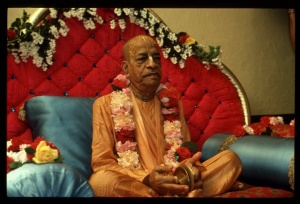CC Madhya 8.182

A.C. Bhaktivedanta Swami Prabhupada
TEXT 182
kā kṛṣṇasya praṇaya-jani-bhūḥ śrīmatī rādhikaikā
kāsya preyasy anupama-guṇā rādhikaikā na cānyā
jaihmyaṁ keśe dṛśi taralatā niṣṭhuratvaṁ kuce ’syā
vāñchā-pūrtyai prabhavati hare rādhikaikā na cānyā
SYNONYMS
kā—who; kṛṣṇasya—of Lord Kṛṣṇa; praṇaya-jani-bhūḥ—the birthplace of love of Kṛṣṇa; śrīmatī—all-beautiful; rādhikā—Śrīmatī Rādhārāṇī; ekā—alone; kā—who; asya—His; preyasī—most dear friend; anupama-guṇā—having unparalleled qualities; rādhikā—Śrīmatī Rādhārāṇī; ekā—alone; na—not; ca—also; anyā—anyone else; jaihmyam—crookedness; keśe—in the hair; dṛśi—in the eyes; taralatā—unsteadiness; niṣṭhuratvam—firmness; kuce—in the breasts; asyāḥ—Her; vāñchā—of the desires; pūrtyai—to fulfill; prabhavati—manifests; hareḥ—of Lord Kṛṣṇa; rādhikā—Śrīmatī Rādhārāṇī; ekā—alone; na—not; ca anyā—anyone else.
TRANSLATION
“‘If one asks about the origin of love of Kṛṣṇa, the answer is that the origin is in Śrīmatī Rādhārāṇī alone. Who is the most dear friend of Kṛṣṇa? The answer again is Śrīmatī Rādhārāṇī alone. No one else. Śrīmatī Rādhārāṇī’s hair is very curly, Her two eyes are always moving to and fro, and Her breasts are firm. Since all transcendental qualities are manifested in Śrīmatī Rādhārāṇī, She alone is able to fulfill all the desires of Kṛṣṇa. No one else.’
PURPORT
This is a quotation from Śrī Govinda-līlāmṛta (11.122) by Kṛṣṇadāsa Kavirāja Gosvāmī. It is a verse in the form of questions and answers describing the glories of Śrīmatī Rādhārāṇī.